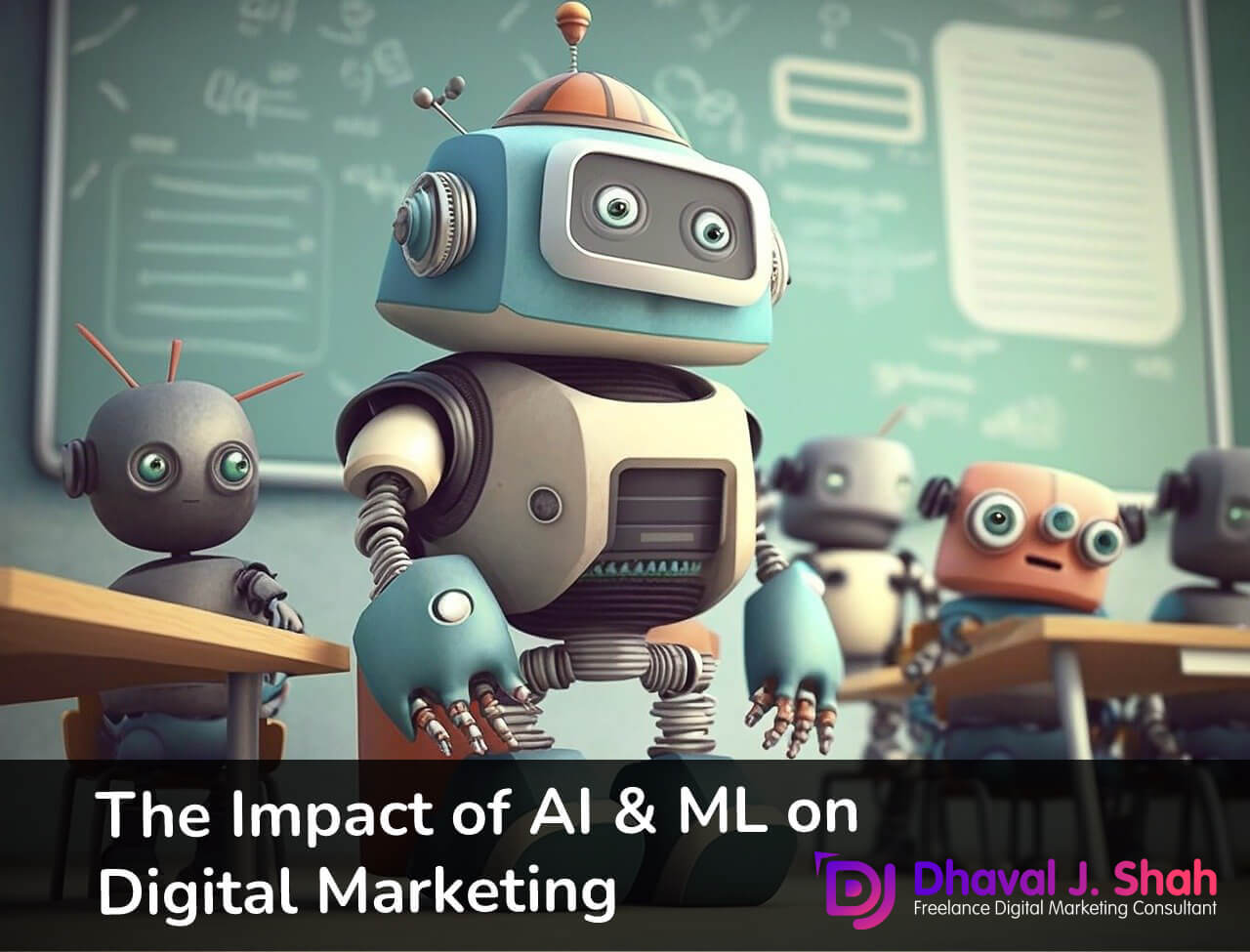Table of Contents
I. Introduction
A. Artificial Intelligence (AI) and Machine Learning (ML) are rapidly becoming essential technologies in the digital marketing industry. These technologies allow businesses to analyze large amounts of data, predict customer behavior, and create personalized marketing campaigns.
B. In this blog post, we will explore the impact of AI and ML on digital marketing and how businesses can leverage these technologies to improve their marketing efforts.

II. Predictive Analytics
A. Predictive analytics is the use of data, statistical algorithms, and machine learning techniques to identify the likelihood of future outcomes based on historical data. In digital marketing, predictive analytics can be used to analyze customer data and predict future behavior, such as which customers are most likely to make a purchase.
B. Predictive analytics can be used to identify patterns and trends in customer data, such as demographics, purchase history, and browsing behavior. By understanding these patterns, businesses can create targeted marketing campaigns that are more likely to be successful.
C. For example, a retail company could use predictive analytics to identify customers who are most likely to be in the market for a new winter coat. They could then target these customers with personalized email campaigns or social media ads featuring winter coats.
III. Chatbots and Virtual Assistants
A. Chatbots and virtual assistants are computer programs that are designed to simulate conversation with human users. In digital marketing, these technologies can be used to interact with customers in real-time, providing quick and personalized responses to customer inquiries.
B. Chatbots and virtual assistants can also be programmed to provide recommendations, such as product or service suggestions, based on customer preferences and behavior. For example, a chatbot on a retail website could suggest similar products to a customer who is viewing a particular item.
C. Many companies are now using chatbots and virtual assistants to improve customer service. For instance, a customer service chatbot can be integrated into a company’s website or social media platforms to provide quick and accurate responses to customer inquiries.
IV. Optimization of Digital Advertising
A. AI-ML technologies are being used to optimize digital advertising by automating and improving the targeting, placement, and creative aspects of digital advertising. Machine learning algorithms can be used to analyze data on customer behavior and preferences, and then use this information to target ads to specific groups of customers.
B. For example, a company that sells running shoes could use machine learning to analyze data on customers who have shown an interest in running. They could then use this data to target ads for running shoes to these customers.
C. AI-ML technologies can also help in predicting the best time to show ads to a particular customer, resulting in increased conversion rates.
V. Personalization
A. Personalization is the use of customer data to create highly targeted marketing campaigns that are tailored to the individual needs and interests of customers. AI and ML can be used to analyze customer data and identify patterns and preferences, which can then be used to create personalized marketing messages.
B. For example, a company that sells beauty products could use AI to analyze customer data and identify which products are most popular among customers with a particular skin type. They could then create personalized email campaigns featuring those products for customers with that skin type.
C. Personalization can lead to increased customer engagement and lead to increased conversions and sales.
VI. Customer Service
A. AI and ML can be used to improve customer service efforts by automating customer service interactions. Natural Language Processing (NLP) can be used to understand customer inquiries and machine learning algorithms can be used to provide quick and accurate responses.
B. For example, a company could use NLP and machine learning algorithms to analyze customer inquiries and provide personalized responses through their website chat or email. This can improve the customer service experience by providing quick and accurate answers to common questions, reducing the need for customers to wait for a response from a human customer service representative.
Additionally, AI-powered virtual assistants can also be integrated in mobile apps to provide on-the-go customer support, offering a more convenient and efficient way for customers to get answers to their questions.
VII. ROI
A. AI and ML can improve marketing ROI by automating repetitive tasks such as data analysis and customer segmentation. This can save businesses time and resources which can be redirected towards more strategic marketing efforts.
B. Additionally, AI and ML can provide businesses with more accurate insights and recommendations, which can help them make more informed decisions about their marketing campaigns.
C. According to a report by Accenture, AI-based technologies can help businesses increase their revenue by 38% by 2035. Furthermore, a study by McKinsey & Company found that companies that have adopted AI-based technologies have seen a return on investment (ROI) of up to 300%.
VIII. Conclusion
A. In conclusion, AI and ML are rapidly transforming the digital marketing landscape. These technologies are providing businesses with new and powerful tools to better understand their customers and provide more personalized, effective marketing campaigns.
B. By leveraging AI and ML, businesses can improve their marketing ROI, drive growth and increase revenue. As the use of AI and ML in digital marketing continues to evolve, businesses that adopt these technologies early will be well-positioned to take advantage of the many benefits they offer.
C. As a freelance Digital Marketing professional, I have all the updated knowledge and skills in AI and ML to help businesses improve their digital marketing efforts. I offer most affordable services for businesses looking to adopt AI and ML in their digital marketing strategies.
